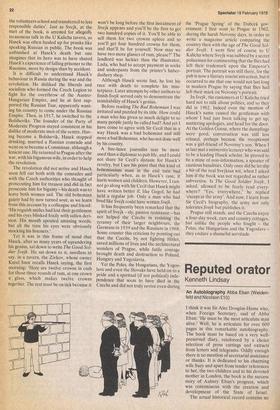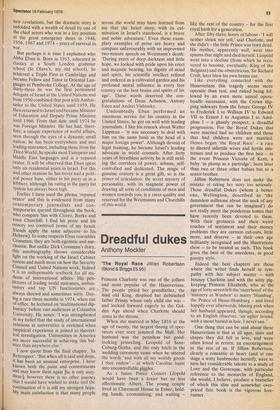Reputed orator
Kenneth Lindsay
An Autobiography Abba Eban (Weidenfeld and Nicol son £10) I think it was Sir Alec Douglas-Home who, when Foreign Secretary, said of Abba Eban: 'He must be the most articulate man alive.' Well, he is articulate for over 600 pages in this remarkable autobiography. The book must be based on a very wellpreserved diary, reinforced by a choice selection of press cuttings and extracts from letters and telegrams. Oddly enough there is no mention of secretarial assistance or thanks. It is dedicated to his charming wife Suzy and apart from tender references to her, the two children and to his devoted mother in London, the book is the success story of Aubrey Eban's progress, which was coterminous with the creation and development of the State of Israel.
The actual historical record contains no new revelations, but the dramatic story is unfolded with a wealth of detail by one of the chief actors who was in a key position at the great emergency dates in 1948, 1956, 1967 and 1974 — years of survival in war.
But perhaps it is time I explained who Abba Eban is. Born in 1915, educated in classics at a South London grammar school (St Olave's, my old school), he achieved a Triple First at Cambridge and became Fellow and Tutor in Oriental Lan guages at Pembroke College. At the age of thirty-three he was the first permanent delegate of Israel at the United Nations and from 1950 combined that post with Ambas sador to the United States until 1959. He then returned to Israel and became Minister of Education and Deputy Prime Minister until 1966. From that date until 1974 he was Foreign Minister. He has had, there fore, a unique experience of world affairs, seen through the eyes of a dynamic small nation; he has been everywhere and met leading statesmen, including those from the Third World; he speaks most European and Middle East' languages and is a reputed orator. It will be observed that Eban spent Only six residential years in Israel. For this and other reasons he has never had a polit ical power base, either in his party or in a kibbutz, although his rating in the party list System has always been high.
Earlier I have used the phrase 'reputed orator' and this is evidenced from many contemporary journalists and con temporaries quoted throughout the book, Who compare him with Cicero, Burke and even Churchill. I find his prose and his oratory too contrived (some of my Israeli friends apply the same adjective to his Hebrew). In some respects Eban resembles Crossman; they are both egotistic and narcissistic. But unlike Dick Crossman's diary, this autobiography throws considerable light on the working of the Israel Cabinet system and much more on how the Security Council and United Nations work. Indeed it is an indispensable textbook for all students of international affairs. His pen pictures of leading world statesmen, ambas sadors and top UN functionaries are always shrewd and sometimes witty. Dur ing a rare three months in 1974, when out of office, he lectured on 'multinational dip lomacy' before vast audiences at Columbia University. He notes: 'I was strengthened in my belief that the study of international relations at universities is enriched when empirical experience is joined to theoret ical investigation. Universities in America are more successful in achieving this balance than anywhere else.'
I now quote from the final chapter, 'In Retrospect': 'But when all is said and done, It has been an unusual enterprise. I have known both the pains and contentments and may know them again [he is only sixty three]; however there is no other journey that I would have wished to make and the continuation of it is still my strongest hope. My main satisfaction is that many people across the world may have learned from me that the Israel story, with its culmination in Israel's statehood, is a brave and noble adventure.' Even these exemplary examples of prose are heavy and compare unfavourably with an improvised two-minute speech on Weizmann's death: 'During years of deep darkness and little hope, we looked with pride upon his erect and majestic bearing, his dignity of mind and spirit, his scientific intellect refined and ordered as a cultivated garden and his profound moral influence in every free country on the best brains and spirits of his age'. These words deserved the congratulations of Dean Acheson, Antony Eden and Andrei Vishinsky.
Undoubtedly Eban performed an enormous service for his country in the United States; he got on well with leading journalists. I like his remark about Walter Lippman — 'it was necessary to deal with him on the same basis as the head of a major foreign power'. Although devoid of legal training, he became Israel's leading advocate in world counsels. After forty years of breathless activity he is still striding the corridors of power, urbane, selfcontrolled and dedicated. The magic of genuine oratory is a great gift, so is the power of articulation: the secret mystery of personality, with its magnetic power of drawing all sorts of conditions of men and women towards you, is a rarer quality and reserved for the Weizmanns and Churchills of this world.



































 Previous page
Previous page